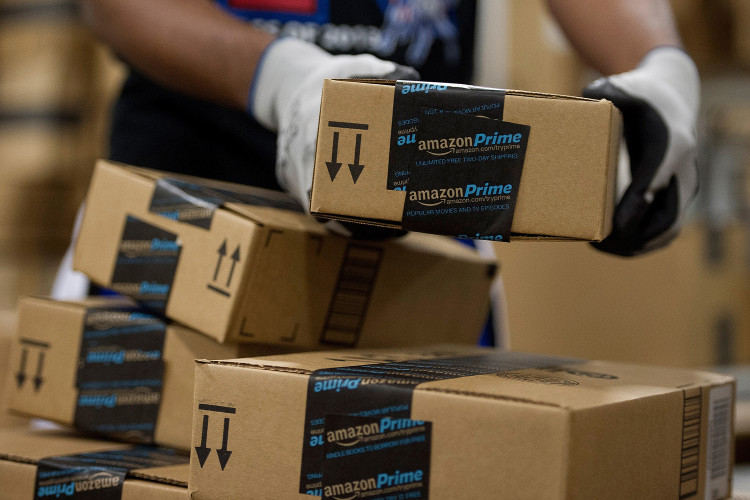Trump Attacks Amazon Again After Aide Denies Policy Changes

published Mar 29, 2018, 12:59:31 PM, by Toluse Olorunnipa and Jennifer Epstein
(Bloomberg) —
President Donald Trump on Thursday fired off more criticism at Amazon.com Inc., saying his problems with the internet retailer predate his election a day after a report that he’s “obsessed” with regulating the company.
“I have stated my concerns with Amazon long before the Election,” Trump tweeted. “Unlike others, they pay little or no taxes to state & local governments, use our Postal System as their Delivery Boy (causing tremendous loss to the U.S.), and are putting many thousands of retailers out of business!”
Trump also has repeatedly attacked news coverage of his administration by the Washington Post, owned by Amazon Chief Executive Officer Jeff Bezos, and linked unflattering reporting in the newspaper to Bezos and Amazon. In one tweet last summer, he asked “Is Fake News Washington Post being used as a lobbyist weapon?”
Brad Parscale, who is managing Trump’s 2020 re-election campaign, said in a tweet that “Amazon has probably 10x the data on every American that Facebook does. All that data and own a political newspaper, The Washington Post. Hmm…..”
Amazon shares erased a premarket gain of as much as 1.7 percent after the tweet. Amazon declined to comment on Trump’s tweet. The stock was up 0.5 percent at 1:54 p.m. in New York.
The company’s market value plunged $53 billion Wednesday after Axios reported that Trump wants to impose further regulations on the company. White House press secretary Sarah Huckabee Sanders said later Wednesday that the administration isn’t considering any changes in policy directed at the company.
White House Spokeswoman Lindsay Walters repeated that sentiment to reporters Thursday.
“The president has expressed his concerns with Amazon. We have no actions at this time,” she said.
Sales Tax
The President omitted some key facts in his criticism. Amazon collects sales tax in every state that has one.
There is one big loophole, however: Amazon’s policies don’t apply to third-party merchants selling goods through its website, and many of those transactions remain untaxed. Such sales make up about half of the company’s volume. Amazon has said it’s up to the sellers to collect any taxes and many don’t.
“The president has talked about the need to have tax parity between online retailers and brick-and-mortar retailers,” White House spokesman Raj Shah said on Fox News on Thursday. “Right now, there is no internet sales tax and as a result companies like Amazon can buy and sell goods without having to pay basic retail taxes.”
The Trump administration has urged the U.S. Supreme Court to let state and local governments collect billions of dollars in sales taxes from online retailers. The justices are scheduled to hear arguments next month centering on a South Dakota law that calls for collecting sales taxes from large internet retailers even if they don’t have brick-and-mortar stores in the state. A ruling is expected by late June.
Representative Kristi Noem, a South Dakota Republican, has called for legislation requiring online retailers to collect sales tax. The effort failed after Noem was unable to get enough support among Republicans.
Some states have gone ahead and passed such laws. On April 1, Pennsylvania will become the second state, after Washington earlier this year, where Amazon will collect sales tax on behalf of its sellers.
Postal Service
In late 2017, Trump said Amazon should pay “much more” in fees for delivery. Amazon regularly uses the Postal Service to complete what’s called the “last mile” of delivery, with letter carriers dropping off packages at some 150 million residences and businesses daily. It has a network of 35 “sort centers” where customer packages are sorted by zip code, stacked on pallets and delivered to post offices for the final leg of delivery.
The mail service is independently operated and strikes confidential deals with retailers. Analysts have said that Amazon pays USPS about half of what it would pay UPS or FedEx.
“At the end of the day, the standard rule, the standard of care, is: Are consumers better off? And ultimately I think consumers are better off with Amazon and I think that will prevail with this debate,” said Gene Munster, managing partner at Loup Ventures, in an interview on Bloomberg TV.
–With assistance from Margaret Talev, Justin Sink and Spencer Soper.To contact the reporters on this story: Toluse Olorunnipa in Washington at tolorunnipa@bloomberg.net ;Jennifer Epstein in Washington at jepstein32@bloomberg.net To contact the editors responsible for this story: Alex Wayne at awayne3@bloomberg.net Molly Schuetz, Elizabeth Titus
COPYRIGHT
© 2018 Bloomberg L.P



No Comment